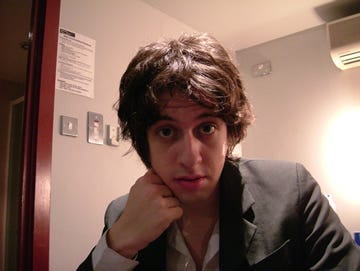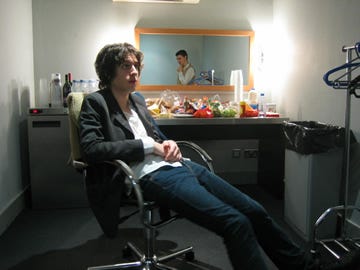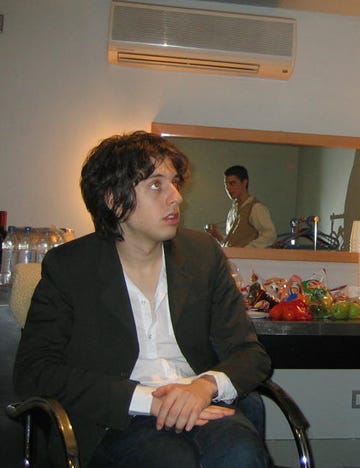Interview: Adam Green
If interviewees put themselves about too much, if they give interviewers what they want, people will lose interest. To get more attention they have to tease their interviewers, keeping them guessing, offering them a delicious detail, but only occasionally. Perhaps the greatest example of the interviewee as flirt is Bob Dylan in Don’t Look Back, who is utterly captivating without giving anything away. Interviewers, on the other hand, should never be too ingratiating. If they are, they’ll be toyed with and tossed aside.
Waiting for Adam Green in the bleak, grey corridors of the Islington Academy, I worried that he would play me for a fool. I imagined him being either cute, monosyllabic or banal, his lyrics are nihilistic enough to make you think so. Instead, I found a goofy kid, dopey and confused. I doubt he was actually doped up, but he has clearly done enough drugs to slow him down.
Unlike Pete Doherty, who he supported on tour last year, Green doesn’t use drugs to achieve romantic oblivion. It’s drugs that tweak and twist consciousness that interest him, prescription drugs and hallucinogens. Later that evening, he asked the crowd “Was anyone here at the show where I did a mushroom per song?” He then proceeded to recommend benzodiazepines to the assembled throng of devotees.
A better explanation for why Adam Green is like he is can be found in the promotional movie for his latest album, the rollicking, extravagant, critically-panned, Gemstones, which features a 17 year old Green singing outlandish karaoke on MTV. This is revealing for at least two reasons. Firstly, it reminds you that Green is still very young himself, only 24. And second, it shows that he derives a particular satisfaction from outraging bourgeois norms.
With this in mind, it was rather interesting to see – on the morning of the interview – pictures of Green aged 13 from his high school yearbook appear on a fan site. The figure in these pictures is far from the amoral, heart-throb-without-a-heart on the cover of Gemstones. Which is where I started the interview.
How have you changed since those pictures were taken?
“There’s really no comparison. I was still doing music, my brother taught me to play different instruments – the tuba, the clarinet, trumpet, violin. It was always reading sheet music – classical kind of things. It wasn’t until I was about that age that I got a guitar. The reason I was interested in the guitar is because you can write songs on it. That was about the age when I thought that music wasn’t just about playing what other people had written but also your own stuff.
“I really didn’t go to school until I was 12. My mum thought it was, like, a good idea to teach me from home. Which you shouldn’t really do. It’s not really a good way to learn. But this is the way that her parents did it and she did it with me.
“And I suppose that was how I made my first friends at school, we’d sneak into the guitar room and play like mini-shows and stuff. It was a way to relate to people. And er, erm, also I was searching for something. I wanted to meet the people I saw on TV when I was growing up, so my first friends were like drug kids who sold speed. I mean they’d play music for me, a lot of underground records that I never would have heard otherwise. But I wasn’t that into that scene, like I needed to get out of it, cos it isn’t that good for your health. I started going to the other side of town where there was a record store. Started working there eventually. And those people who worked there were really knowledgeable about music. and I’d ask them a million questions. They knew about everything. It seemed.
“I continued like that until I was 17 and we moved. My Dad got a job as a Professor at Columbia University,” he says this with a note of pride. “So we moved out to there.”
As you can see, Adam Green talks about this period with fluency. I am reduced to assenting with the odd ‘hmmm’ and ‘I see’.
“I guess the first thing I started doing was playing the subways. After I had been busking the whole day and was packing up, somebody came over and said: ‘you should go to the Sidewalk Cafe’. And it turned out that that was where the whole Anti-Folk scene was from. It had been going on there for 20 years, it was a really old scene.
“In Anti-folk the emphasis is on original material. Anything goes. The currency is the music, and you can’t become prominent on that scene without having the tunes to back it up. Y’know. That’s the interesting thing about it. The problem is that the guy who runs it is such a disagreeable character that people don’t want to give him any props or shout outs. He’s a real snake.”
Lach?
“Yeah, Lach. I like him. He can be really terrible. He makes people not want to say that they came from there for some reason. I always thought it was cool. I thought Anti-Folk was some cool shit. I wanted to tell everyone about it.
“The truth is, a lot of the people you’ve heard have come out of that scene. Even people like the Spin Doctors or Suzanne Vega, or like Beck. Big people came to play at the anti folk open mic. They didn’t want to identify with it. Or they just wanted to forget.
“Me and Kimya didn’t care. We had a lot of friends who we thought should be big stars. That was why we made that compilation Anti-Folk Volume 1 for Rough Trade. People just didn’t want to hear it. People just could not be bothered with it. I could not believe it. They were ready. Diane Cluck, Ish Marquez, Turner Cody, Tommy Eisner. These were some of the best people I know who play music and they’re not exposed by the media at all. Most people don’t even know them!
“People ask me who my favourite band is. Who are my favourite band? I’m not even in a band. I’m interested in individuals, people with personalities. It’s a shame. Just cause they didn’t have the right haircut of something. People were not ready to receive but they are, they still are, the hip people. The Anti-Folk people.”
My second question had been lingering on my lips for so long that I could hardly remember it. The subject of Anti-Folk exhausted, I return to the original subject under discussion. What do you think the 13 year old Adam Green would think of the Adam Green of today?
“That’s an interesting question. It’s probably the same for everybody in that they’d be intrigued in some way, but they’d also be repulsed. And that they’d also be somethings they’d admire.
“If you just think about all the projections of the future you’ve had for yourself over the years and how none of them came true… but maybe a little piece of them came true. And then the finished person is like the shape of the sea eroded into the sand. And it’s nothing you can really predict. It’s just what did happen, it’s nothing like what you wanted.”
He ponders this more before testily saying:
“The truth is that I don’t think I would care what that guy thought about me now. Because I’m on my own trip. That 12 year old couldn’t get to me.” He emphasises this last sentence a certain paranoia.
Looking through high school yearbooks is one thing, but have people started going through your ‘trash’?
“Not yet. It’s flattering, I guess. I welcome an interest in what I’m doing. As long as people don’t do horrible things to me that’s fine. It’s like people writing about me on the internet. I don’t read all that stuff!”
How does it feel to have all these kids adoring you?
“It’s a great feeling. But, you know, no one wants to hear about how great my life is. I’ll tell you about how great things are now … y’know I’m also missing home right now.”
What is the high point of your life thus far?
“I wouldn’t want to be in any place other than where I am now. There’s no point thinking like that. I’m just more interested in what I’m going to do next. I try not to be sentimental.”
And the opposite, the low point of your life?
“Uh. I don’t know. Adolescence was pretty low. When I was a kid I had a nice life, a nice run, a bunch of years when I was very happy – playing baseball, listening to lots of music. And then at a certain point things got really dark. Around the time I was 13 to the time I was 19 or 20… it got very dark during that period. I really wanted to follow my own path and there was a lot of resistance from my family.”
What kind of resistance?
“I come from the kind of family where there are a lot of expectations to go get a degree at school, to have a certain kind of career path. And I didn’t take it. I didn’t go to school. I didn’t work for anyone else. I only work for myself and they didn’t like that. Honestly, I used to go to these family gatherings and holidays and everyone would just take it in turns laying into me, y’know ‘you’re doing the wrong thing.’ Like, I was going to fail in life. ‘Why could I have not been more like so-and-so?'”
They said this to your face?
“It wasn’t behind my back, we were not shy. I got told that my music was not any good, that I wasn’t going to be anything – by my family! And I still have a chip on my shoulder about it. But at the same time now I don’t take it serious anymore because I don’t have to ask them for anything.”
Do you ever worry that you’ll lose that chip on your shoulder and you won’t have the same motivation?
“No, I’m a musician.”
Do you write everyday? Is it a job for you?
“I don’t write everyday. I write a little bit here and there. It can take me up to a month to write a song. I think I could do something different. I could see myself flying commercial airliners. I’d like to do flights over central America. I just have a book coming out.”
What’s the book about?
“Different kinds of poems, different kinds of things I write in a pocket notebook, long lists of one-liners. One bit I typed as fast as I could for one day – for ten days in a row – and then edited it down into something much shorter. It’s very concise and compact, the kind of thing to read on the subway. Read a few lines, come in at any place, read it on the toilet.”
So it’s not like Pete Doherty’s Notebooks of Albion?
“Well, maybe. But mine is more edited down. It’s pared down to the essentials. I don’t think it’s boring. People won’t find it boring to read. It’s like, uh, it’s like creative writing. I don’t know what Peter’s doing. I think he’s in rehab, actually.”
Apparently, he’s released from prison today. Do you have any advice for him?
“We’re not that close. I’m glad he took me on that tour with him. He’s always been a really stand-up guy with me. He taught me how to play a bunch of the Libertines songs and we did that tour together, and him and Carl and I did some recordings in New York for fun. Trouble is, now you see kids dressed like Pete at my show and they just idolise him so much they’re stealing stuff and being little jerks. I can’t believe it! I’m holding him responsible for creating a new kind of little rascal. Y’know, I don’t really care what he does, as long as he doesn’t do anything foul to me personally.”
The music of Adam Green is somewhat different in tone to the lyrics …
“People say that, but I don’t agree with that. I mean, I think that’s just the time we’re living in right now. I think the reality is that subject matter has very little to do with melody. They actually have very little to do with each other. I mean everyone knows, it’s plain to see that the words fit just fine to the songs. If anything that contrast is just adding depth and realism to the song. Just because people aren’t accustomed to hearing certain words placed next to certain melodies doesn’t mean that they’re wrong. They’re probably more right than most things. I mean, that’s what the people who relate to me, listen to me and come to see me think.
“People sometimes think they know what I’m going for when I’m doing it, they’ve got no idea what I’m going for. I’m doing what comes naturally to me. It’s my own substance, my own style and it’s nothing to do with what other people say is good.”
So do you see yourself as a kind of noble savage, someone who is intuitively or naturally good?
“Nobody is good naturally. I don’t think of myself as a savage, but I think I follow my own intuition.”
A girl commented on Momus’s journal that she spoke to you when you were working at a store called Rags-a-Go-Go. Anyway, apparently you handed her a tape and said to her ‘listen to this I’m going to be a superstar one day.’
“She actually said that? Well, I guess you can kind of will yourself into anything.”
She also said you were a kind of geeky kid. Is that a fair description?
“Sure, I was just like a loner, I guess. I had a few friends and we just like read comic books and I used to program computers. We used to play a lot of video games. I don’t know. Take drugs.”
Did you consider yourself an outsider?
“I don’t know if I was an outsider. I never felt like an outsider. I felt like I was just doing my thing. There was always like, friends around, girls around who thought me and my friends were cool and we were just doing our own thing. I don’t consider myself to be an outsider, just somebody who was doing what I wanted.”
Like a magpie, Green notices the Hammer and Sickle on the badge I’m wearing. I ask him if he’s interested in communism.
“I believe in compassion to some extent, maybe have people not quite as rich and not quite as poor. But you need to have the incentive to go up in the world. Don’t take that away, man, cos it’s just not worth living if everyone gets the same shit. Not everyone needs the same shit, some people need lots of stuff and are going to do something with it. Others really don’t, they’re not going to do anything. I don’t subscribe to the ideals of communism. I think that certainly there could be some redistribution of wealth, cos it’s not fair that people don’t get antibiotics or people need medicines. They should get them if they need them. I’m certainly not into the idea of going to kill anybody, not murdering people just because somebody tells me too.”
So, would you go to Canada if you were drafted?
“I don’t know what I’d do. I certainly wouldn’t kill anybody.”
Of course, with Iraq and the current administration there’s always a possibility that you could get called up.
“I just wouldn’t do it. Wouldn’t pull the trigger. I feel I have a relationship with people. I’m not in an alliance with other animals. But people, we have a certain understanding that we don’t kill each other.”
Adam Green mixes the homely and the unheimlich like no one else. For this reason, it is oddly appropriate that he has taken David Hasslehoff’s mantle as Germany’s favourite American singer. In Germany he is lauded as a surrealist genius (who happens to be cute), elsewhere he is tolerated as a geek (who happens to be cute). The truth lies somewhere in-between. He is a distinct presence, an imaginative presence, in a dull scene. As an interviewee, as a person and as a musician he gives a lot of himself, but always on his own terms. Ultimately, it is this that sets him apart.
Neil Scott | Autumn 2005
Acknowledgments: Last three photos were taken by my marvellous assistant for the day, Phoebe Weston, without whom there wouldn’t have even been an interview.






